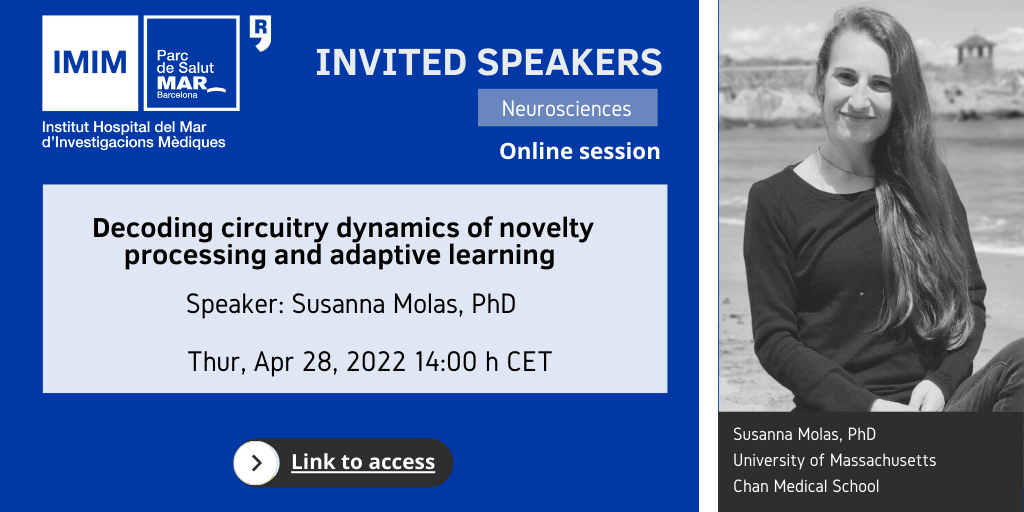
28/04/2022
Virtual, a les 14:00h
Us convidem al pròxim IMIM Invited speakers Seminar, que tindrà lloc el dijous 28/04/2022 a les 14:00 h en format virtual. El títol serà "Decoding circuitry dynamics of novelty processing and adaptive learning", a càrrec de la Dra. Susanna Molas, de la University of Massachusetts Chan Medical School.
________________________________________________________________
We invite you to the next IMIM Invited speakers Seminar, which will take place on Thursday 28/04/2022 at 14:00 h in virtual format. The title will be "Decoding circuitry dynamics of novelty processing and adaptive learning",by Dr. Susanna Molas, University of Massachusetts Chan Medical School.


Abstract:
Novelty and adaptive learning with familiarity represent evolutionary conserved motivational drives critical for the adaptation to changes in the environment and goal-directed behaviors. Alterations in these responses contribute to numerous neuropsychiatric and neurodevelopmental disorders, although the understanding of such fundamental processes has remained elusive. Accumulating evidence indicate that midbrain dopamine (DA) systems guide approach/avoidance behaviors to different types of novelty. In addition, we previously demonstrated that the interpeduncular nucleus (IPN) of the midbrain represents a neuroanatomical substrate for familiarity signaling and the preference for novelty. The IPN is a major component of the habenulo-interpeduncular pathway that connects the limbic forebrain with midbrain/hindbrain areas. However, the precise real-time activity patterns of DA systems and IPN circuits causally linked to novelty and familiarity responses is unclear. Using fiber photometry recordings with biosensors we have found that both ventral tegmental area (VTA) DA cell body activity and ventral striatum DA release are significantly engaged by social novelty and respond following classical reward prediction error signals when novel social stimuli transition to familiar upon repetition. Instead, IPN GABAergic activity is inhibited during novel social investigations but engaged by familiar, indicating opposite activity dynamics of these two midbrain systems. Circuit-tracing analysis reveal that IPN GABAergic neurons strongly innervate the laterodorsal tegmental nucleus (LDTg), a region that sends excitatory inputs to VTA DA. This IPNGABA – LDTg circuit conveys inhibitory dynamic patterns during novel stimuli interactions. Moreover, time-locked optogenetic stimulation of the IPNGABA – LDTg pathway bidirectionally modulates novelty seeking behavior, suggesting the IPN indirectly targets components that regulate DA transmission to control novelty responses. The present study unravels a new circuitry within the novelty network that may be key in understanding disrupted social novelty response observed in neurological disorders.
© Institut Hospital del Mar
d'Investigacions MèdiquesAviso legal y Política de Privacidad | Política de cookies | Mapa Web | Accesibilidad | Dirección y accesos | Contacto